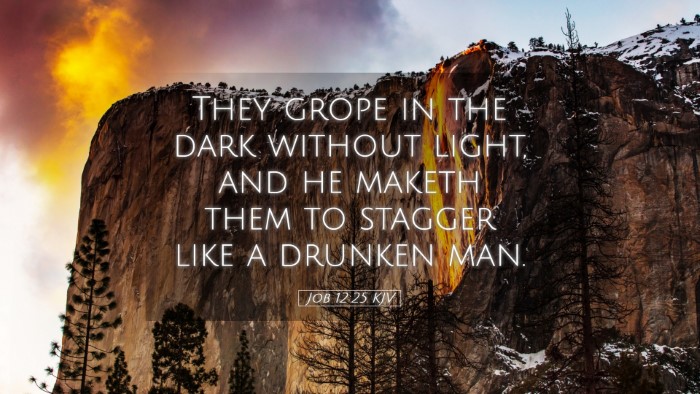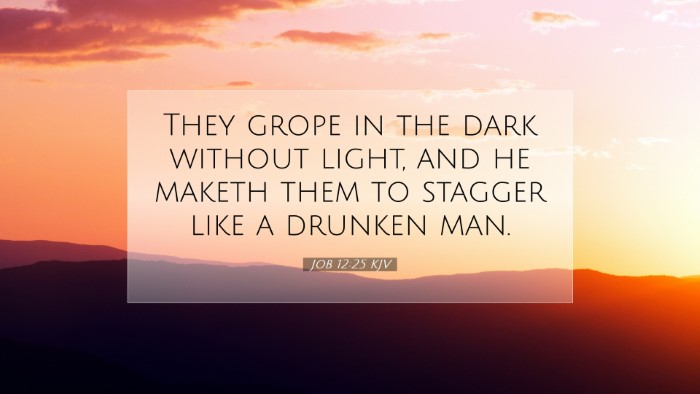Old Testament
Genesis Exodus Leviticus Numbers Deuteronomy Joshua Judges Ruth 1 Samuel 2 Samuel 1 Kings 2 Kings 1 Chronicles 2 Chronicles Ezra Nehemiah Esther Job Psalms Proverbs Ecclesiastes Song of Solomon Isaiah Jeremiah Lamentations Ezekiel Daniel Hosea Joel Amos Obadiah Jonah Micah Nahum Habakkuk Zephaniah Haggai Zechariah MalachiJob 12:25
Job 12:25 KJV
They grope in the dark without light, and he maketh them to stagger like a drunken man.
Job 12:25 Bible Commentary
Commentary on Job 12:25
Verse Context: Job 12:25 states: "They grope in the dark without light, and he maketh them to stagger like a drunken man."
Overview
This verse encapsulates the profound sense of despair and confusion that Job perceives among the wicked and the ungodly. Throughout the book of Job, we encounter themes of suffering, divine justice, and human understanding, often culminating in the acknowledgment of God's inscrutable ways. Job's assertion in this verse highlights the moral and spiritual blindness that can ensnare individuals who reject divine truth and the consequences that follow from such a rejection.
Insights from Public Domain Commentaries
-
Matthew Henry's Commentary
Henry speaks to the analogy of groping in the dark, suggesting that it represents the lack of wisdom and understanding that plagues those who are away from God. He emphasizes that just as a drunken man staggers, so do the wicked stagger through life, unable to find a clear path due to their blindness to spiritual truth.
Further, Henry notes that the "dark" refers to both moral corruption and ignorance, leading these individuals into grave dangers. This staggering signifies the instability of their lives and decisions, a sobering warning against living apart from divine guidance.
-
Albert Barnes' Notes
Barnes delves deeper into the metaphor, arguing that the condition of groping signifies helplessness. He emphasizes that those who are disobedient to God will find themselves in a state of confusion, unable to discern truth or righteousness. Barnes points out that the absence of light represents a complete rejection of divine instruction, leading them to err in their paths.
He further explains that Job contrasts this with the experience of the righteous, who walk in the light of God's word, offering a clear distinction between the outcomes of wisdom versus folly, faith versus disbelief.
-
Adam Clarke's Commentary
Clarke provides an extensive breakdown of the verse, illuminating its theological implications. He describes the darkness as both spiritual blindness and the deep moral depravity that results from departing from God’s commandments. Clarke reiterates the idea that God permits the wicked to stumble as a form of judgment; their lack of insight stands as a testament to their estrangement from divine truth.
Moreover, Clarke connects this passage to the greater narrative of Job, underscoring how suffering often brings one closer to understanding the nature of God's justice. He mentions that such staggering is not just random but serves a purpose in God’s overarching plan for humanity.
Theological Implications
The implication of Job 12:25 extends beyond its immediate context and relates to broader theological themes. The struggle with darkness and confusion signifies a profound existential reality for humanity, especially in times of suffering. It brings to light the necessity of divine enlightenment through revelation and the essential role of seeking truth rooted in scripture to avoid spiritual blindness.
In pastoral applications, this verse serves as a crucial reminder for believers to remain steadfast in their commitment to God’s truth, lest they become like those who wander aimlessly, blind to the consequences of their actions. The admonition found in Job’s words challenges both believers and non-believers to consider the source of their understanding and direction in life.
Practical Applications
-
Awareness of Spiritual Blindness:
Believers are called to reflect upon their inner lives, asking whether they are blinded by pride, unconfessed sin, or distraction from the pursuits of this world.
-
Need for Divine Guidance:
Job’s lament reminds the faithful of the importance of relying on God’s light in their lives, emphasizing the daily practice of prayer and scriptural meditation as means of gaining wisdom and guidance.
-
Encouragement in Suffering:
In times of distress, understanding the purpose of suffering assures believers that their struggles are not in vain and that God uses them to reveal deeper truths.
Conclusion
In conclusion, Job 12:25 serves not only as a poignant expression of the plight of the ungodly but also as a clarion call for self-examination among the faithful. It highlights the profound contrast between the lives of those who walk in the light of God’s truth and those who choose to dwell in darkness. As such, it remains a timeless reminder of the need for spiritual vigilance, repentance, and constant communion with God to navigate life’s complexities with clarity and purpose.


